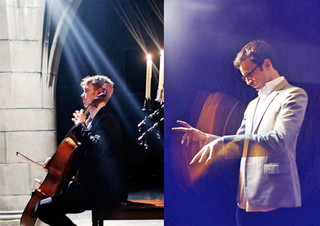|
Back
The Silence of Sounds New York
Crypt, Church of the Intercession
09/18/2019 -
The Instant and the Eternal:
Arvo Pärt: Fratres – Spiegel im Spiegel
Alfred Schnittke: Sonata for Cello and Piano No. 1
Joshua Roman (Cello), Conor Hanick (Piano)

J. Roman, C. Hanick (© Andrew Ousley)
“Out beyond ideas of right and wrong is a field where our souls lie down in the grass, where the world is too full for sound. I’ll meet you there.”
Rumi (Jalāl ad-Dīn Muhammad Rūmī) (1207-1273)
Several times last night in the Church of the Intercession crypt, producer Andrew Ousley, cellist Joshua Roman and pianist Conor Hanick mentioned that their program had been arranged for its very singular venue. That was a challenge indeed, since the only appropriate sound for a crypt is...well, silence. And while the “full burial-chamber” audience could have sat in silence, meditating on the walls or the candles or the Yamaha piano, that stuff is reserved for a Cage rather than a crypt.
Instead, this splendid duo chose North European works from composers so opposite that–in non-Euclidian, Stephen Hawking terms–they did meet in the universe of the dead.
Estonian Arvo Pärt’s relation to Eastern Church is as fervent (and as faraway) as Rumi to Islam or Zen to the Buddha or Spinoza to Judaism. His music is that of silence–even when the silence makes a sound. In Fratres (Brothers), arranged for cello and piano, those one-note cadential bangs on the lowest piano notes, could conceivably have been one-note Nirvana silences, and the work would have gone on as before.
His opposite was the Russian Alfred Schnittke, whose music embraced the whole world. And at times, the universe. Nothing, absolutely nothing in style or meaning escaped his grasp. And in the First Cello Sonata last night, his “crypt-ic” message was both solemn and funereal and–in a the most savage waltz from the second movement–fierce and cutting.
The result of these two works, as well as Pärt’s Mirrors in the Mirror was no applause. (Mr. Ousley had requested that), as well as a blanket laid on the outwardly impassive audience.
Producer Andrew Ousley had suggested one could possibly meditate during the music. I found that a kind of insult to the artists. Outside of Buddhist chanting and the occasional Hare Krishna, music–even the silences of music–are to be heard and processed.
That was certainly true on Fratres. I had never heard the arrangement for cello, but Mr. Roman’s instrument was, if anything, more effective that the original violin. Before the original piano rotations, the cello flutterings were dark and mysterious, almost orphic in their secrets. As the work went on, the time signatures changed, the modal harmonies became more obscure, and those cadential bangs on the piano changed color, changed volume.
Fratres has now, possibly to Mr. Pärt’s wry humor, been incarnated not only to different instruments, but to a popularity like Pachelbel’s Canon. Yet well worth its fame.
Arvo Pärt’s second work closed the program. Spiegel im Spiegel started with a triple-note rising crochet, an exact mirror of Beethoven’s Moonlight, yet with minor changes throughout, as if a different mirror reflecting a different mirror reflecting...
You get the idea. An infinity enclosed in ten minutes. Also, Pärt’s tintinnabulation theory, where Mr. Roman’s cello commented on, embraced and seemingly improvised on the repetitions.
Mr. Pärt once said, “Everything in art is possible, but everything is not necessary.” A good obiter dicta for life as well.
Where Arvo Pärt’s best-known music is predictable, nobody ever knows where Alfred Schnittke will go. On the surface, that’s the fun of it. He can imitate any style, he can quote any music, he has a dazzling technical skill, he wrote prodigiously, he was always a surprise.
I had never heard this Cello Sonata before, but Schnittke obviously was telling a personal tale in the three movements. Meditation in the first, a dervish-like dance for cello and hard-nosed waltz for piano in the second. And in the third?
Ah, here was music for the crypt. Any crypt at all. Barren, landless, skyless. Not a requiem, since requiems promise life after death. This was death with notes, death leading to death.
A harsh end, but magnificent playing.
The silence after the final work was applause, of course, and one thought nothing appropriate could follow. But Mr. Roman broke through the mediational music with his own work.
Actually, it was Leonard Cohen’s Hallelujah: not a blazing adoration of God, but a bitter reflection on lost love. Mr. Roman’s voice was personal, lyrical, understated. His cello did the hard work. Each of the strophes brought out a different modality, a different voice from his instrument. Certainly not to show off what the artist could do, but what it could do to paint the song, engrave the song, and finally to show only the lines.
Everything, in fact, but the silence. All three composers gave us sounds. Our own composure after the concert could have been, should have been, unspoken.
Harry Rolnick
|